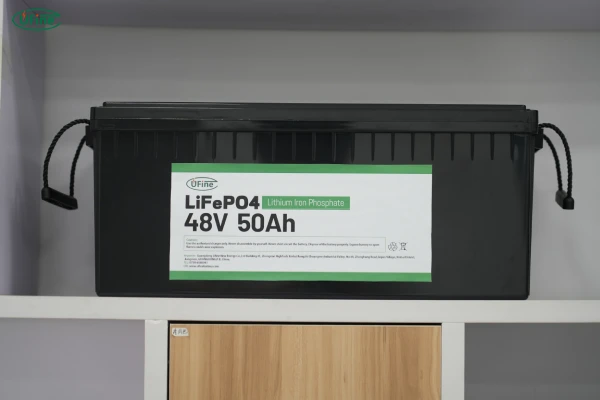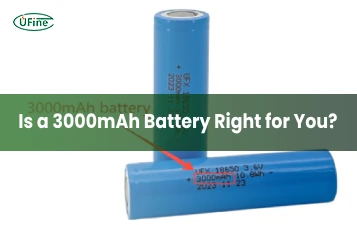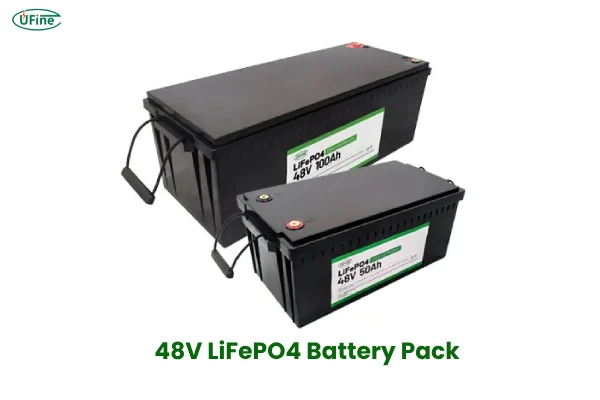Choosing the right 48V Li-ion battery pack is more important than ever. Whether you’re upgrading an e-bike, powering a solar system, or building a new EV, selecting the correct Ah (ampere-hour) capacity can make or break your project.
It’s easy to get overwhelmed. Higher numbers sound better, right? But it’s not that simple. You need the right balance — not too much, not too little. So let’s dive deep into how to choose wisely.
Part 1. Key components
Before we talk about capacity, let’s quickly understand what makes up a 48V Li-ion battery pack.
A standard battery pack includes:
- Lithium-ion Cells: These are the heart of the battery, storing energy.
- Battery Management System (BMS): This smart circuit monitors voltage, temperature, and health to prevent dangers like overcharging.
- Casing: Protects the internal components from shock, dust, and water.
- Cooling Mechanisms: Especially in high-capacity packs, to prevent overheating.
Each component must work in harmony. A weak link anywhere affects the overall performance.
This is exactly why companies like Ufine Battery, a leading Chinese custom lithium battery manufacturer, invest heavily in precision manufacturing. We offer custom lithium polymer batteries, LiFePO4 batteries, 18650 batteries, and more, tailored to different needs.
If you have specific requirements for size, voltage, or discharge rates, Ufine Battery can help you customize the perfect solution.
Part 2. How many cells are inside a 48V Li-ion battery pack?
A single lithium-ion cell typically has a nominal voltage of 3.6V or 3.7V.
To create a 48V pack, you need about 13 or 14 cells connected in series (13 × 3.7V ≈ 48V).
- Series connection = Adds voltage
- Parallel connection = Adds capacity (Ah)
A high-capacity pack might have several strings of 13 cells connected in parallel to boost ampere-hours without changing the overall 48V output.
In short: More parallel groups = Higher Ah.
Batteries In Series Vs Parallel:Which Is Better?
Part 3. 48V Li-ion battery vs Lead-acid battery
You might wonder: Why not just use an old-school lead-acid battery instead?
Well, let’s see how they really compare:
| Feature | 48V Li-ion Battery Pack | Lead-acid Battery |
|---|---|---|
| Weight | Lightweight, portable | Very heavy and bulky |
| Lifespan | 2000–5000 cycles | 300–500 cycles |
| Charging Time | 1–3 hours | 8–12 hours |
| Efficiency | Above 95% | Around 70% |
| Depth of Discharge | Up to 90% | Around 50% |
| Maintenance | Almost none | Frequent maintenance needed |
| Cost Over Time | Lower (fewer replacements) | Higher (frequent replacements) |
Part 4. Is Higher Ah always better? How to choose?
This is the big question!
Many people think, “more Ah = better battery.”
But that’s not always true.
Here’s the deal:
- Higher Ah means longer run time and bigger energy storage.
- However, it also means bigger size, heavier weight, higher cost, and sometimes slower charging.
How to decide the right Ah for you?
- Daily Usage: Are you using the battery for 30 minutes or all day?
- Load Power: Are you running a 100W device or a 5kW inverter?
- Portability: Do you need to carry it often?
- Budget: Higher Ah batteries cost significantly more.
For light daily use (e-bikes, scooters): 10Ah–20Ah is great.
For solar systems or golf carts: 50Ah–100Ah or more is needed.
Still confused?
Talk to Ufine Battery! Our engineers can help you match the perfect Ah to your actual needs. Contact Ufine Battery today for a free consultation.
Part 5. How long does a 48V lithium-ion battery last?
Most good-quality 48V Li-ion battery packs last between 5 to 10 years depending on usage.
You can estimate usage time like this:
Run time (hours) = Battery Capacity (Wh) ÷ Load Power (W)
Example:
- A 48V 20Ah battery has 960Wh (48 × 20).
- If your device uses 100W, then 960 ÷ 100 = about 9.6 hours.
Of course, real-world usage varies because of inverter losses, temperature, and other factors.
Part 6. What affects the life of a 48V Li-ion battery pack?

Several factors will impact how long your battery survives:
- Overcharging or Deep Discharging: Hurts the cells.
- High Temperatures: Accelerates aging.
- Poor Chargers: Deliver uneven voltages.
- Physical Damage: Impacts internal chemistry.
How to extend lifespan?
- Always use a quality charger.
- Avoid draining the battery completely.
- Store it around 50% charged if unused for a long time.
- Keep it in a cool, dry place.
Trust me, taking care of your 48V Li-ion battery pack can easily double its usable life!
Part 7. How to choose a charger for a 48V Li-ion battery pack?
Never overlook the charger — it’s as important as the battery itself.
Key tips:
- Match Voltage Exactly: Only use a 48V charger!
- Right Amperage: Too high = stress, too low = slow charge.
- Smart Functions: Auto shut-off and overvoltage protection.
- Certifications: UL, CE, RoHS to ensure safety.
Part 8. Price
When considering a 48V Li-ion battery pack, it’s important to budget appropriately. The price of these packs depends on several factors:
- Capacity (Ah): Higher Ah packs cost more.
- Brand: Premium brands tend to have higher prices.
- Battery Chemistry: LiFePO4 tends to be more expensive than traditional Li-ion batteries due to better longevity and safety.
- Customizations: Batteries tailored for specific applications, such as solar energy systems or e-bikes, can increase the price.
On average, a standard 48V Li-ion battery pack can range from $300 to $2,000. For example:
- A 48V 10Ah pack might cost around $350-$500.
- A 48V 20Ah pack could range from $600-$1,000.
- A high-performance or customized 48V pack could go as high as $1,500-$2,000 or more.
Remember, while it may seem costly initially, the longevity and efficiency of a Li-ion battery far outweigh the cost over time.
Part 9. Popular brands
When selecting a 48V Li-ion battery pack, it’s crucial to consider the brand. Trusted brands ensure reliability, longevity, and performance. Some popular brands in the market include:
- Ufine Battery: Known for high-quality and customizable lithium battery packs. Whether it’s for e-bikes, solar power systems, or golf garts, Ufine Battery provides premium solutions.
- LG Chem: A top-tier brand offering reliable and high-performance battery packs, often used in e-bikes and electric vehicles.
- Panasonic: Another trusted name, with batteries known for their durability and high efficiency, often used in energy storage systems.
- Samsung SDI: Offers cutting-edge battery technology with long cycles and high energy density.
- A123 Systems: Famous for their high-performance lithium iron phosphate batteries, suitable for a wide range of industrial applications.
Choosing the right brand can ensure you’re getting the best value for your investment. Always look for customer reviews, warranties, and certifications.
Part 10. Installation, maintenance tips, and safety considerations
Installing and maintaining a 48V Li-ion battery pack safely is crucial.
Installation Tips:
- Secure the battery firmly to avoid movement.
- Ensure proper ventilation around the battery.
- Keep it away from water, fire, and direct sun exposure.
Maintenance Tips:
- Regularly inspect for loose connections or corrosion.
- Clean contacts gently with dry cloths.
- Monitor the health with BMS apps if available.
Safety Considerations:
- Use correct chargers only.
- Never puncture, crush, or expose the battery to flames.
- If the battery swells, smells odd, or gets unusually hot, stop using it immediately.
Part 11. FAQ
Can I upgrade my 48V lead-acid system to lithium-ion?
Absolutely! But you might need a new charger or BMS upgrade.
Should I fully charge my battery every time?
Not necessary. Charging to 80–90% actually extends life.
How should I store my battery long-term?
Store it at about 50% charge in a cool (around 20°C) and dry place.
Can I use any 48V charger for any 48V battery?
No. The charger must match your battery’s chemistry and recommended specs.
How do I know if my battery is reaching end of life?
You’ll notice faster voltage drops, slower charging, or reduced capacity.
Related Tags:
More Articles

Is a 3000 mAh Lithium Battery Enough for Your Device?
Wondering what a 3000mAh battery means? Learn about its power, lifespan, types, and how to choose the best one for your device!
Learn About Lithium Battery Kits
Discover the ultimate guide to lithium battery kits—types, safety, installation, and cost analysis. Make the right choice for solar, RV, or off-grid power!
LiFePO4 Pouch Cells Explained: Advantages, Applications & Comparison
Learn all about LiFePO4 pouch cells, their structure, lifespan, advantages, and how they outperform other lithium battery types. Make the right choice!
12Ah Lithium Battery Guide: Uses, Lifespan & Tips
12Ah lithium batteries last longer, charge faster & weigh less than lead-acid. See best uses, charging tips & how to extend lifespan!
How to Choose the Right 48V Battery for Your E‑Bike?
Choosing the right 48V e-bike battery depends on motor size, usage, chemistry, and safety—this guide helps you make the best decision.




